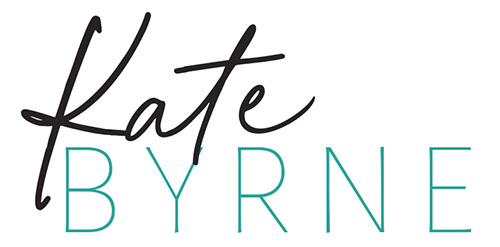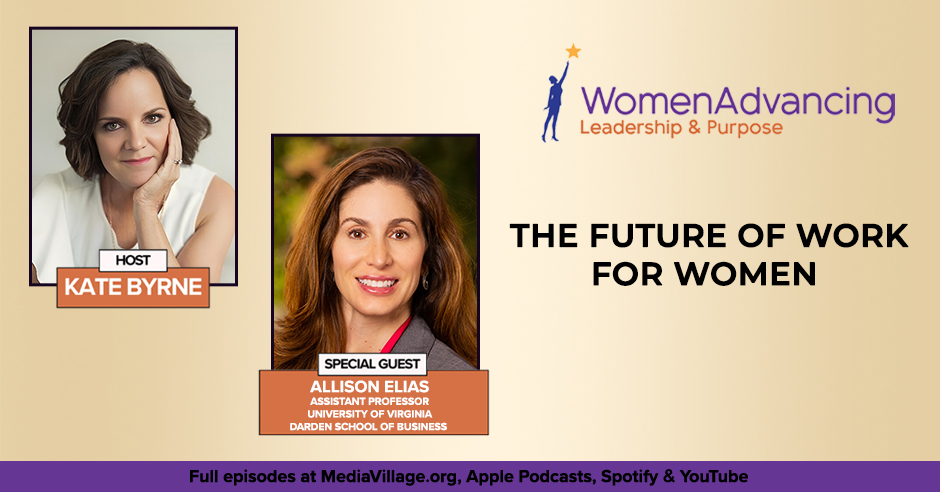
The future of work for women is evolving at an unprecedented pace, creating new challenges and exciting opportunities. This episode explores the changing landscape of women in the workplace with Allison Elias, Assistant Professor at the University of Virginia’s Darden School of Business. Allison shares her insights on navigating career transitions, aligning your values with your work, and finding a job that brings a sense of purpose and joy. She also discusses the importance of mentorship, sponsorship, and networking in advancing your career. Discover how to break free from outdated expectations, embrace your unique strengths, and create a fulfilling career that reflects your authentic self.
—
Watch the episode here
Listen to the podcast here
The Future Of Work For Women With University Of Virginia’s Darden School Of Business Assistant Professor, Allison Elias
For this conversation, I wish I had a crystal ball sometimes, don’t you? Especially when it comes to figuring out where my next opportunities lie. Our guest, Allison Elias, who’s an assistant professor at the University of Virginia’s Darden School of Business, focuses on the future of work and women. We’re going to take a look at this notion of reflecting on alignment with who you are, what your job does, and what your job demands of you.
We’ll take a little bit of a moment to also talk about the roles of our family when we’re making decisions and when we’re talking with our partners about what our shift is going to be and who’s going to take the lead out in the workplace. We’re going to look at what’s beyond job performance and we’re going to adjust and address the gender gap, once again, in AI. Is it friend or foe? It could be our friend, but that’s up to us. We got to roll our sleeves up and jump in. Come in, take a listen, and see what you can learn.
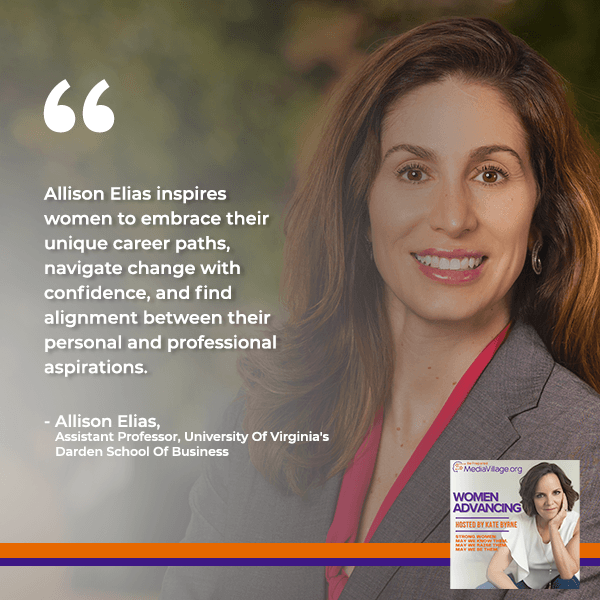
Meet Allison Elias: Navigating Careers & Gender In The Workplace
Welcome, Allison Elias, Assistant Professor at the University of Virginia’s Darden School of Business. Your specialty is the Future of Work and Women. I’m so glad to have you here at Women Advancing.
Thanks for having me, Kate.
Before we go on with what’s going on in the world, I want you to share a little bit of your story. Everyone feels like and assumes that everybody’s path is so linear and vertical. I’d love to hear a little bit about your journey and how you got to where you are today.
I grew up in Roanoke, Virginia. I became interested in women and gender issues for a couple of things. One was most of my friend’s moms didn’t work and my mother didn’t work. There was this one guy I was friends with and his mom was a bank executive. She always showed up to school looking very glamorous. I remember being in awe of the difference. Not that working is not glamorous, but there was this distinction. Back then, when everyone went to the office, you had to appear the right way in certain industries. I don’t know why it struck me from a young age, but I found her fascinating.
The other thing was that I remember starting junior high and my mother said, “Allison, you’re in sixth grade now. You can babysit.” She started booking me these neighborhood babysitting jobs. I was the worst babysitter. I would show up and I was terrified of these children. They ran all over me. I remember having a pit in my stomach. I was the youngest of four. I’d never been in that older sibling role. I said, “Mom, I don’t think babysitting’s for me. I would rather mow yards like my brother, and he makes more money anyway.” My father is super traditional and is like, “No, you’re not mowing yards.”
A young lady doesn’t do that.
A couple of things intrigued me about gender and work. As I went to school, I gravitated toward those issues.
What skills did you rely on in the early days of your career versus what you rely on now?
From History To Business: A Career Pivot
As you said about the linear path, within academia, I had a bit of a transition. My PhD is in history, and I studied women’s history, which was a fascinating way of thinking about women’s voices and storytelling and the way that grand narratives are shaped by the present. These methodological ideas of what counts as history, and how we know what we know about the past.
I taught history for a few years at Cornell, and then I felt like I was more interested in contemporary issues and wanted to have an impact in a different way with my interest in gender. I was able to do a few postdocs at business schools and transition into teaching gender, communications, negotiations, and those kinds of issues in a business school.
I would say that when I was doing that transition in my twenties, saying yes to everything was the way to go because you’re trying to get new opportunities to expand yourself and whoever will take you on and show you things, that’s where it’s worth your time, it’s worth the risk that maybe it doesn’t turn out to be a great learning experience. Now, at Darden, we’re so blessed with the success of our business school and the demands on faculty are high.
I’ve transitioned from, yes, I’d love to participate. I’d love to do that. Does this fit into my career story? That’s the difference. As you’re starting to try to get in somewhere and make it and you’re emerging, you have to be the yes person. Once you feel a little stabilized, you get to start saying no, which is nice.
This is terrific because that is an incredibly important skill. It is the notion of discernment.
That’s a great way to put it, like a reflection of alignment. The word alignment always comes up for me. In my younger self, I felt like the more things I could put on my CV or resume, the better. Now, it’s like what tells a story of a strength down a certain path? I don’t have to be everything. I don’t know. Sometimes even here at Darden, I get asked to go teach something different. It’s not that I don’t want to learn more or teach something different, but why should I be stretching into that area? Is that going to enrich my spot and my story, or is that going to take me off into a place where I’m feeling too thinly stretched everywhere?
That’s true. It’s like, “Great. Is this me? Is this a version or another way of people pleasing?” which we so awesome do, and “Should I do this? Maybe I could.” It’s not “could I.” To your point, it’s like, “Of course, you could.” It’s more “Does that work for me?” which is fantastic. That’s a terrific way of holding on to one’s power.
It is being able to say no and have that insight.
When I was in sixth grade, we all went to dancing school and learned how to do dance ballroom dance. I can remember, we were told, “You always have to say yes when a boy asks you to dance. You have to say yes.” I swear to you, it dawned on me the other day, and I said this to my daughter, “I think I’ve probably in some ways approached my career that way.” When someone asked me to take something on, to your point, I said, “Sure.” Everyone ends up losing in a way, especially if it’s not in alignment and it doesn’t help.
It comes from a place of feeling inadequate or you have to make yourself available. That’s an interesting story about saying yes to boys. I mean, with the maybe understory being like you want somebody to like you and you don’t know who’s going to like you.
The Evolving Workplace & Work-Life Balance
All those frogs, so to speak. That’s an interesting segue into this whole notion of the evolving workplace. Especially with the new administration. I’m not being political at all, just stating a fact. There are going to be certain demands. We’ve already started seeing it coming. What do you see as some of the most critical changes regarding how we work, especially for women? As much as we want to see our partners getting more aware and we’re doing some sharing of responsibilities, still nonetheless, a lot of it often falls on us.
Since COVID, we’re all more remote. We’re all able to use technology and Zoom better to connect. I don’t think there’s a turning back. To some extent, some industries and organizations are trying to force people back into the office. Even in these mandated in-person jobs, at least for professional employees, there’s still going to be an element of if you do have an emergency come up, you’re able to join on Zoom or maybe cancel a work trip and join remotely.
There’s still a lot of navigating with that and thinking through if you’re going into a certain organization or industry that is highly dependent on in-person interactions, I see the MBAs here consider that strongly as to whether they want to take that on or that’s not for them. As new generations keep popping up, I’m not sure employers can go back to the old way.
I agree. I think of my daughter who works in a government job. She’s down in Durham and it’s remote and it’s going to be difficult for her. What does that look like? It makes me think of the office of efficiency. In so many ways, it is often more efficient because you save those commute hours from not having them.
I think back to COVID and we were all teaching online. There were things lost, not being in person, and some loss of connection, and relationships flourishing, but it was an efficient day. No one wanted to be held at home all day, but there did seem to be a lot of time.
You do get a lot done. This makes me think about this whole notion of the impact of technology. Remember how in the early days people were freaking out about Zoom or anything like that. Now, everyone’s old hand is at it. Now the next big, or it’s not even the next, it’s been around in our lives forever and people just haven’t recognized it or didn’t call it out. It’s with A. I’m still trying to figure out whether it’s a friend or foe in terms of opportunities for women and challenges in the workplace. I think there’s a gender gap right now. I don’t know that it will always be there, but I’m curious to hear your thoughts on that. Why is that? Is it helpful or not?
AI And The Gender Gap: Friend Or Foe?
The gender gap is so interesting in AI use. Ever since I heard about that a few months ago, I started paying attention to even myself. Within academia, we’re all scrambling like, “What are we going to do and how do we test students now that they can use AI and all of these things?” It seems like whoever you interact with, it becomes normal. I was on the phone with a colleague a couple of weeks ago. We’re doing some research and she was like, “I’m going to be ahead of this. I’m not going to be the older female professor who doesn’t know how to use AI.”
She was telling me all about like, “Here’s how I’m using it. Here’s what I’m doing.” It inspired me to be like, “I’m going to start paying attention too.” I cannot speak for all women, but I have to let the experts figure it out, and then someone can tell me what to do or how I should implement this in my work. We know from research that men do tend to take risks more. Maybe that means, “I’m going to try this out. I have confidence that I can master this. I don’t have to feel afraid of it.”
As fearful as I am about all the bad things that could be done with it, there are a lot of good things for equity and diversity and equality for gender. We just have to harness it in the right way like any new technology. There will be stories of times when that fails. I see it as a long line of previous technologies. Maybe it’s a lot different, but at this point, women have to have to jump in and try it out.
I agree. To me, given that, I do think there is a younger generation. Plus, I do feel women also tend to be more collaborative and certainly learning styles in institutions like Darden. You do so much teamwork. That’s how I chose to view chatGPT. You’re a collaborator. You’re going to not coach me at all, but if I’ve got questions or I need some direction, I can take it or leave it. That’s the main thing everyone has to realize. We cannot let go of critical thinking.
That is important. As a teacher, I see that that’s where it can go astray. You can tell who turned in assignments that were almost so perfectly structured and worded, but they were vapid. There was nothing underneath them or this analysis wasn’t there. You’re exactly right. If you want to use that to try to prep for something for class, that’s fine, but it’s a discussion where you have to have another round of discussions in your head about it.
Multigenerational & Multicultural Workplace Challenges
You cannot completely take it as is. That’s one of the things too, the whole notion of intergenerational multicultural differences. Your classes now must be very different from how they were, but also workplaces are so different. How is it that power struggles or the dynamics with power and innovation and communication, how they all been impacted? Obviously, greatly and it created some chaos I know.
To take this back to our first discussion about workplace evolutions, I tend to still see the tension there between what it means to be committed to your job. For example, I coach students in negotiating their offers. I regularly have students who say that they’re going to negotiate work-from-home time or that’s something that they’re going to ask about in an interview.
I want them to understand that could be a risky choice. If that’s your priority, go ahead and ask. I said to students, “That’s fine if you want to ask a huge technology company about that, but know that, depending on who you’re talking to, it could signal that you’re not committed as committed as someone else.” He said, “I don’t care. I want a good work-life balance, and if they’re not okay with me asking to leave it.” I think he wanted permission to leave it for some days or something. I don’t know. He had a certain thing he wanted. He’s like, “Then that’s not the right company for me.”
That struck me as interesting. First of all, it’s a man who is prioritizing work-life balance and doesn’t even have kids yet, but he was thinking ahead about that. There was this notion of like, “That’s as far as I’m going to commit to the company. My identity is not tied up in a hundred percent commitment. I have these other aspects of myself I want to nurture and that I want to flourish.”
I find that fascinating because from the Bay Area where so many people collect a company name for your CV, collect all the gold stars and this whole brand. I find that fascinating. It sounds very European with regards to that whole notion, having worked with Norwegians in particular myself. That struck me and they’ve been doing it fine forever. The whole notion of that balance, that work-life integration. I know we did a cover a long time ago in Fouts company. It was all about how balance is bunk.
Can someone have, I mean the age-old debate, work-life balance? Are there things from a policy standpoint, although policy might be too strict, that companies could and should be doing to ensure that women can thrive or flourish in a workplace? Do they even care anymore? I know so many people or so many corporations, especially large ones that have very diverse populations, like Walmart who is backstepping on any commitment to that.
Work-Life Balance Vs. Overwork Culture
It’s so interesting to me because some of these top consulting firms offer unlimited paid vacation and things like that. Are you permitted to take it? I think this is the tension between you could make a policy about something, you could pass a law about it, and in a capitalist system where things are structured the way they are in the US to reward overwork in terms of salary as well as promotions. If you do take six weeks off, if that’s what is allowed at your company or unlimited, are you going to be this generational problem?
It goes with that generational problem. Is that going to be seen as you’re committed, you’re working as hard as you can? People are trying to find creative ways to solve this. Like in corporate law, if you take a parental leave, maybe be moved to fewer projects, but still be able to be engaged in one project to continue your advancement. It’s tricky. I saw something recently about a man at Goldman Sachs who’s suing in the UK. I guess he took six months’ leave and was fired. I don’t know the whole story.
I don’t know if there are other aspects to his dismissal, but he is suing for gender discrimination like Goldman would not have overtly fired a woman for being on parental leave for this long. The backlash in terms of comments online about him was also interesting to me. We do have this generational difference in terms of what it means to be committed. Some of it is based on gender, but some of it is also due to what it used to mean to work hard, which was to be in your office and be available in person.
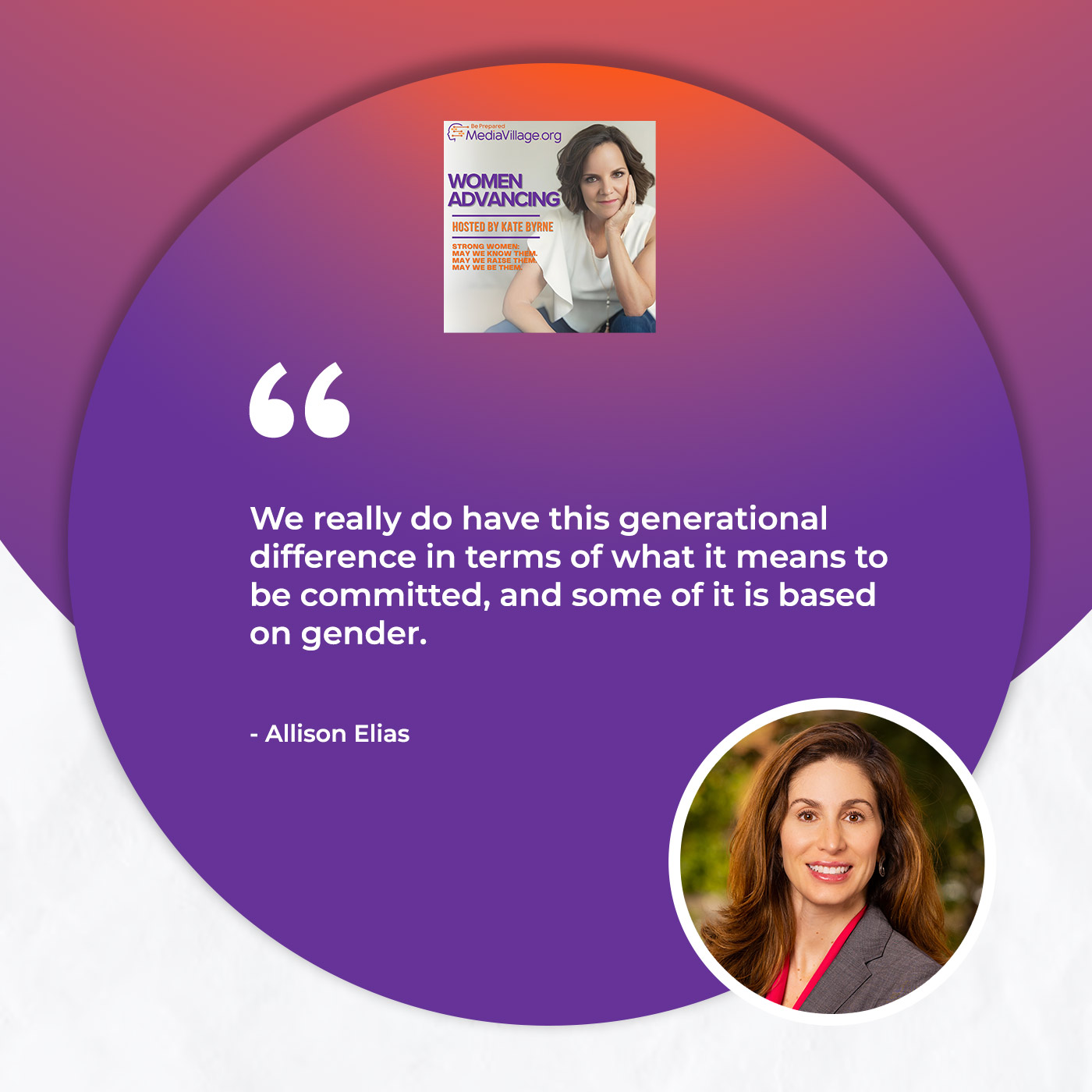
I still remember that at Grey Advertising. It was always everybody was waiting. Some people stretched whatever their work was throughout the day so it went longer. They could say, “I stayed until 7:00, 7:30.” I kept thinking that was so dumb. I had a boss and he was a go-getter but from 3:00 until 7:00, he wrote a letter. I thought, “How is it that you are 2 to 3 rungs above me.” That was after I had given him an outline to follow. I thought all you had to do was add the in-between part. It’s amazing to me. That’s interesting regarding the parental leave. Here, finally, we do have somebody who is taking it. We want everybody to be able to take it but God forbid you do. Do it at your own risk.
One editorial I read from a professor at Toronto was saying that these ideas of masculinity are so baked into our ideas of hard work, because to be able to work that hard, someone else is helping to take care of you and your dependents. If we punish men for not upholding that ideal of masculinity, then we’re not going to be able to have gender equality. It even requires more of a transformation in terms of corporate culture or policy supporting it because it’s very hard. It’s one thing to try to treat women differently, but then to transform the whole culture for men and other genders also is tough.
These ideas of masculinity are so baked into our ideas of hard work, because to be able to work that hard, someone else is helping to take care of you and your dependents. Share on XIt’s a whole systemic approach because you also have to in your social circles. People have to be supportive of it as well.
That is true. There’s an interesting paper that came out a couple of years ago. It was based on this woman’s story. She got married and had a child and her husband didn’t want to move for her academic job. What she ended up doing research into was all the other family members who play into these notions. It’s not necessarily just a negotiation between romantic partners or married partners, but the other voices that are coming in with opinions, maybe not directly, that have a large influence on how somebody manages these career family tensions. I thought that was an interesting line of research that she developed out of her own experience.
I love that because it takes him to account beliefs and practices that we all ourselves adopt, but they aren’t even ours. We see this a lot with women and money. How do we earn it? Do we earn it? Do we save it? Do we give it away as soon as we get it? Who manages it? Culture as well. How many people are one person at work, and then they have to go backward three generations as soon as they walk in their front door and those other roles? It’s a complex thing. I had not thought about the role of the family in that sense.
We’re all products of these different circles we’ve been a part of. Sometimes, those are more vocal voices or more enduring for some people than others.
We're all products of these different circles we've been a part of. Share on XNow, you spend a lot of time with young professionals who are coming back to school with hopes of climbing in the rungs and getting bigger. What advice would you give to women who are, I’m not going to say starting, but coming now stepping out of business school, having a graduate degree, and aspiring to leadership roles? How can they prepare?
Preparing Women For Leadership Roles
I had some women talk about this. My elective finished up and they said, “What I loved about this class is I had never thought about things beyond my job performance as may be indicative of supporting me or helping me advance.” It’s a little bit of a double-edged sword. The Sheryl Sandberg book was all about how women take themselves out of the fight before it even starts.
They plan maybe their career to be on a different track than old research. Women who feel very ambitious and feel like they know they want to advance to an extent in their careers, hopefully, are starting to think about what that means as far as choices about partners or kids. Maybe I want to select somebody who is going to be supportive of that. I even had a friend in finance tell me like, “I don’t want to marry another finance guy. I’m looking for someone who has career ambition and interests, but I want to be the primary career in the family.”
I think people are realizing that it would be very hard for two people to pursue these types of up-and-out careers in banking or consulting. I think women are realizing that and they’re like, “If I know I want to be a partner at an MBB firm, what am I going to do as far as planning, reproductive, doing egg freezing, either finding the right partner now or maybe I’m not worried about finding a partner now. I think women are thinking a lot more about all of these realities that play into career advancement.
I also think that what you come up with now, knowing what you know now, is the context. You get out, you do that, and you get going, yeah, great, fine. It may shift and that’s okay. You may decide you want to hit pause. It doesn’t mean it’s forever at all. You may go right back in and you may reinvent yourself or there may be another industry where those skills that you have and that you are excellent at can be plopped right into a whole other industry that may serve that next chapter of you and what that looks like.
It’s such a good point. I was finishing up a case with a student about an alum from maybe ten years ago who went into one of these top consulting firms and her husband did too. She pivoted into entrepreneurship and the failure she felt because so much of her identity was that she was one of the people who got one of these very elite jobs, and the negotiation with her husband and having to figure out who was going to move off of this track. It’s interesting in terms of trying on different selves and thinking about how maybe you can make a plan now, but it might change and you might not know how you’re going to feel in ten years. You could try to plan for it.
Try on different selves. You can make a plan now, but it might change and you might not know how you're going to feel in 10 years. Share on XYou know who you are now. As you go through all these other work experiences, as in that case, too, you might realize, “This happened to me where I thought I wanted this, then I got it and I thought this is so not my thing.” Again, can I do it? Sure. If I don’t know, is it okay that I don’t like that? That’s the piece. Am I a failure? Am I a wuss? Am I not intelligent? Am I hurting other women?
She felt like, as a woman of color, she needed to fight the fight. What was interesting too about the case when we did the interviews is she had some bad experiences on teams and with projects. The discussion among the students was the way her husband reported his experiences at the same firm were all very positive. Was that people were treating him differently or did he see it in a different way or there was a big disparity and she was unlucky to be on a few teams that were not supportive of her whole self? There were no answers to that but you don’t know how you’re going to navigate through what you choose next and what could end up happening.
Advice To My Younger Self & Career Reflections
Also, the next one might be different. That’s another thing. Don’t glue yourself in and believe me, I’m in a very rock glass house when it comes to this. It’s so much easier said than done. It does, especially when you have had such a bad visceral experience, try and find courage sometimes if it seems like it could be a chance to overcome that fear. For you now, what would you tell your younger self?
I would say don’t be afraid to be vulnerable and ask for help and depend on somebody to help lift you. I remember thinking even in academia that this idea of networking or trying to build professional relationships, I felt like I wanted to be an academic because I didn’t want to be part of that world. What I’ve learned is that the world is everywhere. That’s even how academia works. Your productivity can be a lot tied to relationships. I saw that getting work done and professional relationships are distinct circles previously. I would tell my younger self to not overlook the power of them to overlap and how that could be helpful.
Your productivity can be to relationships. Do not overlook its power to overlap and how that could be helpful. Share on XIt’s interesting. I was reading about Ev Williams one of the co-founders of Twitter. He has started a new social media. I think it’s called Mozi. It’s all about driving real-life connections. To your point, you still need people. There’s no getting around that. On the one hand, I always smile. We all freak out about, “AI, it’s going to take jobs away, where’s the humanity?” Now we need humanity. This is exactly it. Those little networking things. Guess what? Everybody, for the most part, I don’t care, even the most extrovert of extroverts, there are times you don’t even want to have to deal with. I have also found that every time I felt that way if I gutted it out and went, there’s an amazing person that I met. It’s like, “I’m so glad I went in the long run.”
How can you think about this? I always thought of them as icky, and how could you think of them as a connection? Like in any other type of positive relationship, I wonder what drives this person or motivates them or how are we going to end up having similarities or not. Could you look at it as a curious inquiry instead of having to be transactional and get something out of it at this moment?
I was going to say relational versus transactional. It is all about curiosity. For that matter, think of it like, “I wonder who I could help.” I guarantee you, you’re going to find somebody who’s going to help you probably before you even come up with that yourself. Speaking of help, where do you see the greatest opportunities now for women moving forward? We could benefit from your insights.
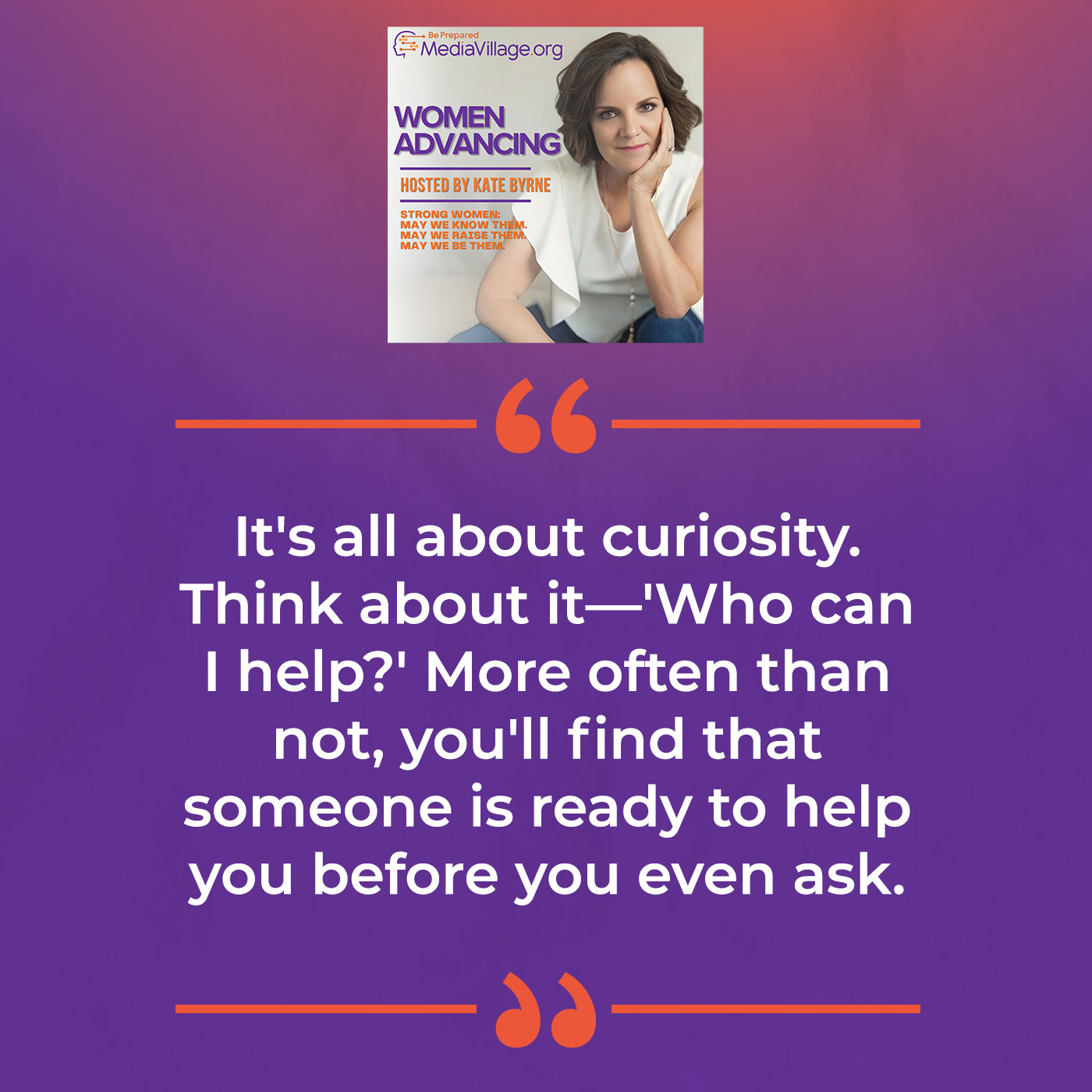
The Future Of Women In AI & Leadership
That’s tough. I think that the use of AI is important because if women stay out of the development of AI and the conversations about it, not that it would be different, but we need everyone at the table to help develop and implement all of this. The types of careers women want are more often now than the types of careers that very accomplished men also want. That could be beneficial. I guess it remains to be seen to what extent as people age and a new generation takes over those leadership and powerful roles, much will change in terms of how work gets done.
Women In Media: Changing The Narrative
We’ll finish on this note and that is this. We started off talking a bit about storytelling or that kind of thing, the story and the career narrative that you have. One of the pieces that I’m working on with Women Advancing in this series is sitting down and speaking with the female leaders of a number of media outlets. I’m curious, I’d love to hear your take on this. Do you think having more women in those senior roles, will there be an impact, a shift, or a change in either the stories that are told or how stories are told and the directions that they take?
I hope so. I would like to think so. I’m glad you brought this back to stories because I think that women can make the most change through telling their stories and using their voices. I’d like to think that as more women are in leadership roles, certain concerns and stories will be more welcome. That’s not always true. A lot of times, particularly if there are very few women, then women want to conform to whatever the dominant paradigm is because they don’t want to be different or be seen as lesser than similarly situated men. I would like to think that as more women rise into leadership, what remains top of mind for companies and organizations will have to shift somewhat, even if implicitly and even if in a way that’s somewhat gender-neutral and not targeting or specifying women in particular.
We look forward to a time where the first question to female leaders isn't what it's like to be a woman and a leader. Share on XIt completely dates me, but I can remember when Carly Fiorina, way back when, was the first female CEO of a tech company, HP. I will never forget, and this quote stuck with me. Everyone said, “What’s your wish? How do you feel?” She said, “I look forward to the day when me becoming a CEO of anything isn’t news.” I think we’re slowly getting there. We’ll see what happens. With more people like you teaching, for sure we will.
Thank you. That’s kind. I hope so. I think that you’re right that if we can get to a spot where the first question to female leaders isn’t like, “What’s it like to be a woman and a leader,” as if the identities are incompatible. I think we’re not there yet. It’s important to still have the discussion and not try to push it underground.
Allison, thank you so much for making time out of your day. I appreciate it. I look forward to continuing the conversation in a number of different ways. That will be shared later.
Thank you, Kate.
Important Links
About Allison Elias
 Assistant Professor Allison Elias teaches courses about communication and negotiation in Darden’s MBA and EMBA programs as well as to executive education learners. She was a nominee for the 2022 Outstanding Faculty Award at Darden, and one of her courses has been rated among the top 10% of all Darden electives (for course content and instructor quality). She received a Wells Fargo Award for Excellence in Course Materials in 2024.
Assistant Professor Allison Elias teaches courses about communication and negotiation in Darden’s MBA and EMBA programs as well as to executive education learners. She was a nominee for the 2022 Outstanding Faculty Award at Darden, and one of her courses has been rated among the top 10% of all Darden electives (for course content and instructor quality). She received a Wells Fargo Award for Excellence in Course Materials in 2024.
Elias has provided expert commentary to media outlets such as NPR, PBS, CNN, and Newsweek, and her research has been featured in Quartz.com and Poets & Quants.
Her research investigates historical and contemporary issues of gender and diversity in occupations and organizations. Her first book was named a Best Summer Book of 2023: Business by the Financial Times, and it was a finalist for the Hagley Prize, awarded by the Business History Conference, for the best book in business history.
Before coming to Darden, Elias taught at the Wharton School, University of Pennsylvania; the Owen Graduate School of Management, Vanderbilt University; the SC Johnson College of Business, Cornell University; and the ILR School, Cornell University. At Cornell she won an exemplary teaching award and was recognized for advancing gender equality across the campus. During graduate school, she gained practical conflict resolution skills as a court-certified mediator.
